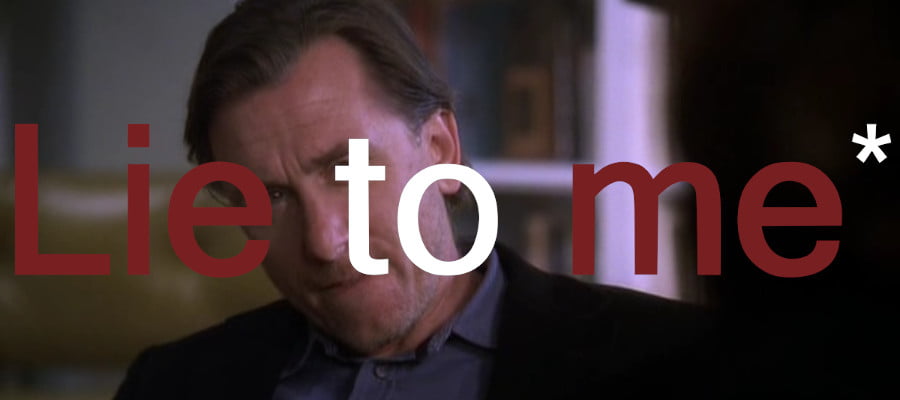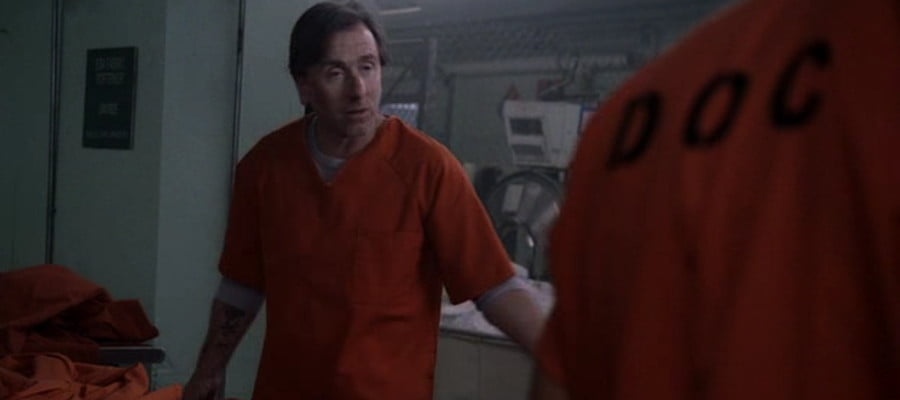A long time ago, I think discussing The Blacklist I used the term ‘crime wizards’ to refer to television programs that focus on characters who do crime in ways that are interesting and challenging to solve and create the tension or systems necessary to justify about an hour of television that can be solved by a specialised team of marketable weirdoes.

There are a lot of shows in the Crime Wizards genre, in different degrees of grittiness – like you can even point to older shows like CSI and NCIS… and along with them, in the transition between eras of Crime Wizard TV, we have this example, of a drama TV show with a compelling hook:
Fake crimes, but real wizardry.
At least, that’s the pitch.
This isn’t Blacklist, where the crime wizards have elaborate schemes with prosthetics and gross components and can dedicate dozens of extras to a new stupid setpiece every week. That isn’t to say they don’t do action, but most of the action is covered by Doctor Tim The Proctor’s Sin: He seems to really enjoy being openly awkward at people and in the first season at least, he at least once gets involved in an action sequence that involves taking a few really well-positioned falls.
But it’s that reduction in action that means most of what you see in this story is focused on these cool characters doing their own kind of crime wizardry, as they use their ‘human lie detector’ abilities to basically have conversations where they know what the other person doesn’t want them to know and it just so happens that’s the kind of thing that’s reasonably easy for a writer (who also knows the truth) can execute without a budget for special events.

What you get out of this is a crew of screwball investigators who are skilled in this specialised field. What’s nice about this lot is because there’s a single, central skillset that all these problems are built around, the cast get to have those skills as central to their characters. It’s not like a conventional Crime Wizards style story where the characters are, you know, FBI agents in the ‘hacker’ ‘gunner’ ‘asshole’ model of structure.
The main cast is, in reverse order of how much they get to do anything that matters, one (1) child, a former TSA agent, a sexual harrassment lawsuit on legs, team mom who is sad about not being a mom, and Our Hero, TimRothman Doctor At Smarts. It means any time these characters are spread out in different locations, they’re all mostly here to investigate, with a very small amount of Modest Action and therefore, the basics of the character interactions are some variation on how they relate to the protagonist of the series, Undead Gildenstern, an exceptionally talented doctor who has specialised in his original research into How People Lie.
Loker has the idea of radical honesty, which means he blurts the ‘first thing’ he’s thinking of. This isn’t true, because he’s also capable of not keeping up a non-stop stream of absolutely stupid stuff while he processes complicated thoughts, but it does make for convenient cover of how he sexually harrasses a new coworker the first time he sees her.
That new coworker is Torres, and she’s meant to be a ‘natural’ talent at lie detection, separating her from the protagonist Tim The Rothman Trainer. She worked for the TSA, where she was extremely efficient and extremely good at her job, which I think means that she harrassed twice as many brown people and disabled people as normal? Her job is to be the protege, the person who the research gets explained to, and to make some of the most shudderingly terrible decisions you can possibly make in the circumstances.
Gillian is a positively delightful character in how she talks to people and what she focuses on, all those details and things she’s paying attention to, at least early on, when she’s not primarily a lens to look at the protagonist more. She’s charming and she’s fun and also there to tell the protagonist that oh, hey, no, you’re overstepping the line or we have to do these things this way for these particular sources because it pays the bills. You know, basically a office assistant.
FInally there’s the protagonist, Doctor Cal Lightman, which is such a great self-insert name. The guy’s a lie expert, and the puzzle of how the case of the day is saved is all about getting him into the closed space with the people who know things and want to conceal it from him. The result is a lot of fun scenes of Tim Roth making someone uncomfortable by being really weird, and that is a task at which Mr Roth is incredibly well suited. The character gets to explain the principles underpinning his behaviour afterwards, even if most of what he’s doing is just typical cons and tricks like you’d see from a detective who wasn’t constrained by principles of uh, like, laws and legal provenance. It’s all very Science Sounding, built on the tantalising premise of a drama series based on the real-world work of Paul Ekman.

This research is, of course, absolute bullshit.
The ‘science’ underpinning Lie To Me is the 100% unfalsifiable pet project of a weirdo who has some let’s say, odd takes. Phil Ekman’s work on microexpressions is not something he’s subjected to peer review, which makes sense, because what he has submitted into public review that got any kind of peer review is a test that the TSA use. This test is, after testing, about as reliable as a coin flip, and mostly doesn’t do anything to defray the personal biases of the participants which means it’s really surprising how often the searches done by the TSA are divided along pre-existing racial and gender biases, weird.
There’s also the way that people who study emotion formation and expression can ‘find no evidence supporting’ Ekman’s entire idea of a universal, simple human language of expressions, which may sound like it’s not a particularly damning indictment until you realise that Ekman’s position is that there is a universal ruleset for all human communication and they can’t find it. If a surgeon said every human had a particular organ and no other researcher could find it, that’s a pretty stiff contrapoint.
This is all also setting aside the way that many researchers like Ekman handle neurodivergent experiences in their approach, which is: They don’t. Too hard, let’s just pretend this universal human experience is universal but it doesn’t include autistic people. This is part of my beef with Caillois’ writing in Man, Play & Games and also Czik- you know what no I’m going to copy paste the name Czihczentmihaly from a google search like every other weak english-language writer does. The point is that there are a lot of these people who are doing work with things that are meant to be universally human that just happen to want to ignore the existence of anything but the most simple of neurotypicals.
It makes sense though that Ekman’s theories would appeal because they make something very difficult (working out what’ strue or not) into something very easy. What’s more, it looks convincing, if you’re dealing with the small bubbles of personal experience. It’s very possible to make a good guess at someone just by observing them, and observing their reaction to the guess – it’s a skill known as cold reading, and it’s a type of manipulation.
This work of Ekman’s is fundamental to the whole wing of ‘body language expertise’ you see on the internet, by the way. Any news program that brings one of them on is basically bringing on a pompous dipshit to espouse their personal biases and draw all sorts of inferences from any given body language detail they want to freeze frame on and go in on at detail. And remember, when they tout them as ‘FBI interrogation expert’ you have to remember how much ‘FBI interrogation’ relies on the leveraged power of a state apparatus that can put you in a box forever. It’s hard to explain how you’re ‘good at something’ when you’re just one part of a toolset that includes life ending torture.
Point is: this whole series is built on a field of pseudoscience popularised and widespread today because of a population of idiots, liars, and assholes.

But that’s what makes the big twist at the heart of Lie To Me all the funnier, something that would have been, in my opinion, the absolute top tier of all possible conclusions: The discovery that Dr Timroth is 100% a con artist and his entire school of research is based on faking seeming sciencey and everyone believes him because it’s very easy to convince white people of things and cops don’t put any energy into doing their jobs.
Of course that’s not where the series goes – I didn’t watch more than the first season, with its maudlin, soppy vision of ‘crime drama’ and its escalated, preposterous reality. Oh, our protagonist, with his deep insights into truth and lies, and how challenging he is to contend with, how difficult his life is, being the one person who can solve the puzzles presented to him by a disconnected sequence of crime wizards. But what I want is a sudden, sharp, embarrassing twist when someone shows up from an actual university trying to ask if Doctor Rothli has some time to go over some replication problems because, well, after all the work he does with the FBI then surely, surely it can’t be that he’s just making shit up —
and suddenly the last part of the series turns into an immense catch-me-if-you-can mystery where our protagonist gets revealed as nothing more and nothing less than a con artist, but whose con was on the police system and who was doing it just because any fairy story that let them feel like they had an inside track was what it took to accept even a bullshit skillset applied to the task of solving crimes.
Not what it is, not where it goes. It winds up being about… like, a divorced dad’s sadfeels or something, who cares.